Education in 2020s: your AI-powered teacher will take your attendance and predict your grades
The steady march of technology is making some jobs obsolete. While reskilling is one solution, can AI be used to change the way students learn and make reskilling easier for future generations?
Andrew NG, Co-founder of Coursera and former chief scientist at Baidu recently likened Artificial Intelligence (AI) to ‘electricity of the 21st century’. He said at a Wall Street Journal event,
Whatever industry you work in, AI will probably transform it, just as 100 years ago the rise of electricity transformed industry after industry. So, I hope that whatever industry you’re in, you’ll figure out how to leverage AI, because I think it will create new winners and losers in almost every category.
What about the new generation of students just entering academia? There is a great need to prepare them for this new, ‘AI-first world’, as Google CEO Sundar Pichai calls it. Academic courses though haven’t been able to keep pace with some of the real-world needs. What is the best way to transform education? Through AI, of course!
Anshul Bhagi and Nikhila Ravi, computer scientists and education entrepreneurs who met as graduate students at Harvard University, recently co-founded OpenEd.ai, a non-profit to develop and promote open-source AI for education. Here is their story.

Taking AI from the dorms of Harvard University to IIT Delhi and beyond
Anshul, a Computer Science graduate from Massachusetts Institute of Technology and an MBA from Harvard, founded and runs Camp K12, an education startup bringing coding to K-12 education in India. Nikhila on the other hand is an alumna of University of Cambridge and Harvard University (ML/AI), and is now an engineer at Facebook.
Talking about how OpenEd.ai came about, Anshul says,
Six months ago, Nikhila and I met as students at Harvard, bound by a common interest in education and a shared fascination for how recent advances in deep learning and natural language processing (NLP) might address inefficiencies in education. We started collaborating on education-focused AI projects such as SochoBot (a tutor bot capable of real-time comprehension and Q&A), and LingoLens (a language learning app that describes images of your world to you in the language you’re trying to learn using deep image captioning).
Throughout these projects, they found open-source code, pre-trained models, datasets and tutorials created by the likes of Denny Britz (WildML.com) and Andrej Karpathy to be of tremendous value. They came to the conclusion that given the steep learning curve ML often requires, and the fast pace at which the field moves within academic/research silos, the ML community will continue to benefit immensely from open-source initiatives that bridge learning and informational gaps.
With a long-term goal of democratising AI in education, Nikhila and Anshul decided to set up OpenEd.ai, a non-profit dedicated to developing and promoting open-source AI for education.
The team then added Shreyas Deshmukh, a Microsoft Product Manager and computer scientist/AI developer, to the organising committee for OpenEd.ai's inaugural event, and together they orchestrated the AI for Education HackWeek that is currently in progress (July 28-Aug 11). The first offline leg of the event took place at IIT Delhi from from July 28 to August 4.
During the global HackWeek, OpeEd.ai offered free computing resources and research resources for all participants courtesy Amazon, IBM Watson, and Digital Ocean; special online workshops courtesy Google, IBM Watson, and Amazon. OpenEd.ai is also offering $19,000 in prizes, including a $6,000 grand prize for the best solution, which will be evaluated by Harvard CS faculty and members of the global ML community.
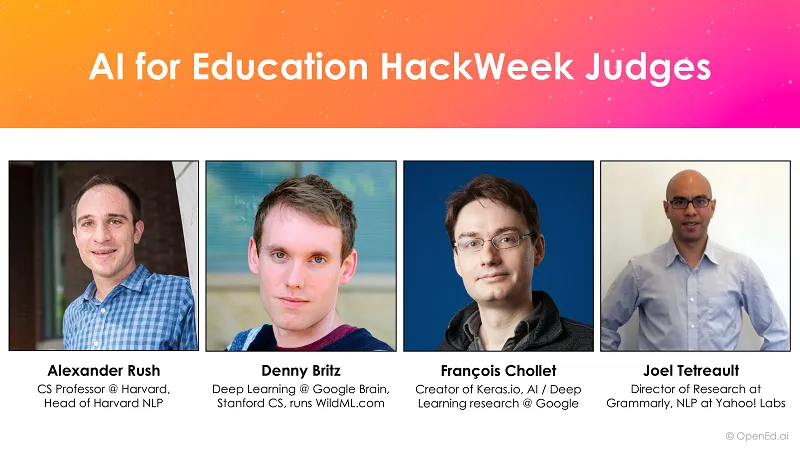
Amitabh Kant, CEO of NITI Aayog, in his keynote address, talked about the challenges in the Indian education system and how technologies like AI could help the country leapfrog. He also announced two additional challenges for the participants, which are also open to the general public.
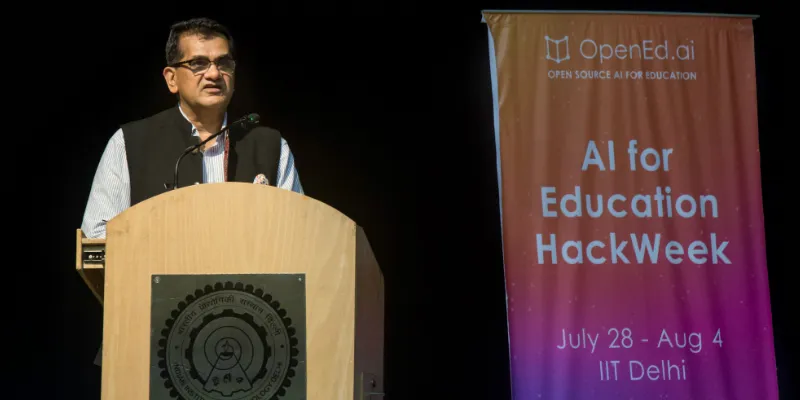
Related read: Can you solve these ‘AI in education’ challenges? You may get to present the solution to government officials
Here is an overview of some of the other workshops at the event.
Can AI lead to better learning outcomes?
Vishal Dixit and Sarvesh Kanodia from Omidyar Network, a philanthropic investment firm established by eBay founder Pierre Omidyar and his wife Pam, talked about unsolved problems and startup opportunities in education AI. Omidyar Network has committed more than $1 billion to for-profit and non-profit organisations. Some of their bets in the education space include ventures like like Code.org, Khan Academy, AltSchool, Teach for India, and Aspiring Minds.
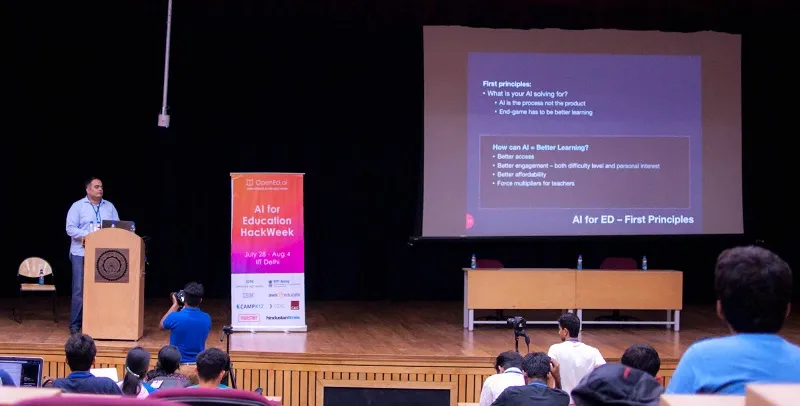
Vishal remarked that every child should have individualised access to education. The challenge is to go from self-paced e-learning solutions to more adaptive and conversational tutoring methodologies. He said,
AI is the process and not the product…. The end game has to be better learning outcomes. I don't believe that teachers will be redundant because of AI, it will instead act as force multipliers for teachers.
Roopa Kudva, Partner and Managing Director for India at Omidyar Network, in a statement said,
Our support to OpenEd.ai HackWeek is aligned with our commitment to supporting innovations in technology. This is an attractive platform for developers to learn from experts working in the cutting edge of AI and leverage their skills towards solving some of the key problems in education.
Man and machine, power extreme
Danish Contractor from IBM Research gave the audience an overview of how IBM is leveraging AI in education to predict future performance and aid childhood learning. He said that by gathering data from schools from Class I to VIII and studying the patterns, they are now able to predict with great accuracy what a grade 4 student would be likely to achieve by grade 8, assuming the same learning trajectory.
Danish also spoke about how learning content analytics and cognitive career counselors could help decrease the burden on human teachers. With Watson’s cognitive solutions, IBM aims to transform the learning experience through personalisation, and help educators gain insights into learning styles, preferences, and aptitude of every student.
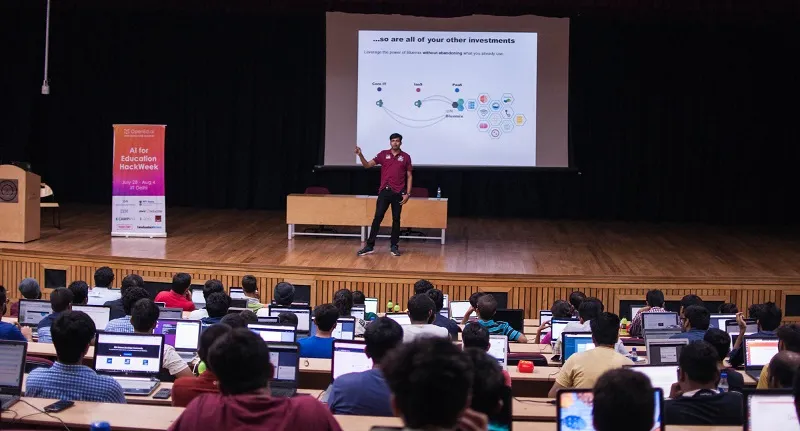
Talking about the complementary and symbiotic role of AI in education, Sriram Raghavan, Director, IBM India Research & CTO, IBM India/South Asia, in a statement said,
We see AI as Intelligence Augmentation (IA) — cognitive systems that work together with humans to enhance (rather than replace) human capabilities. Our goal is to develop technology that works seamlessly with teachers and students and uses AI-driven insights to assist human stakeholders in performing their tasks better — whether it is pedagogy, learning, or administration.
TensorFlow and the basics of machine learning
Manoranjan Padhy and Rohit Gupta from Google gave the audience an overview of artificial intelligence and machine learning. Starting with the basic terminologies used in machine learning they went on to explain the different categories in machine learning, which include supervised, unsupervised, semi-supervised, and reinforcement learning.
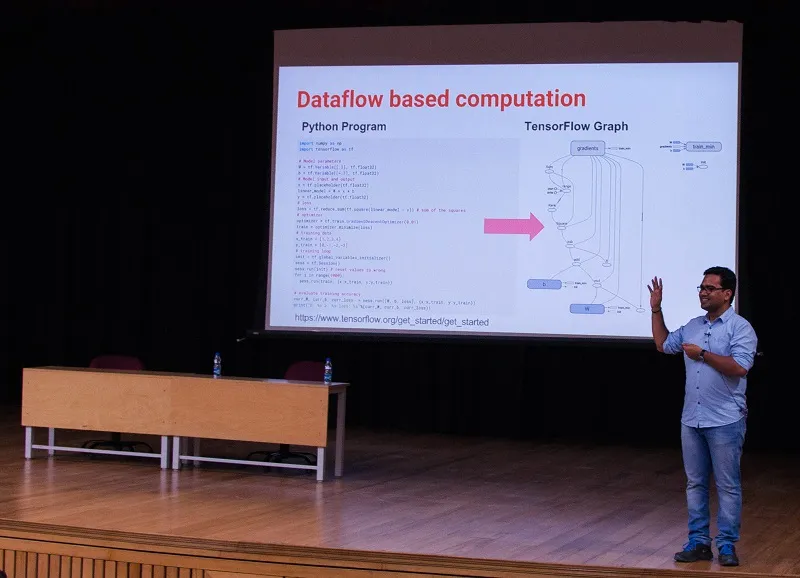
With most of the explaining done, they then introduced the audience to TensorFlow, an open-source software library developed by Google for Machine Intelligence and took them through a few demo challenges.
Six challenges to hack away at...
After the workshops concluded, participants had the option of working on any of the challenges put forth, including two by the Government of India, three by IBM, and one wildcard challenge. It read as:
Apply your knowledge of CS, Data Science, Machine Learning, and NLP to build open-source AI for education, solve any problem in education you're passionate about.
A participant's output can be any of the following:
* Usable products (e.g. chatbots, web apps, mobile apps).
* Data sets (eg scrape public sources to collect data useful for future AI work in education).
* Tutorials and how-to articles for AI-education work you’ve previously done.
Submissions are open until 11.59 pm on Friday, August 11. Learn more about all six challenges and submit your hack here at OpenEd.ai.
Disclaimer: YourStory was a media partner for the event.







